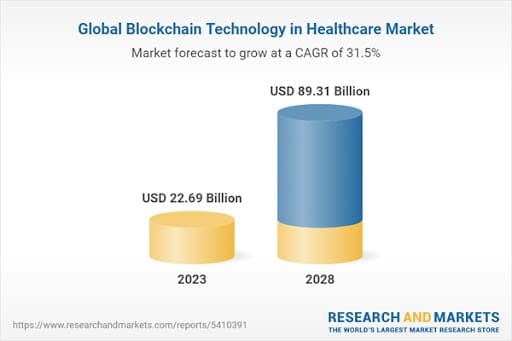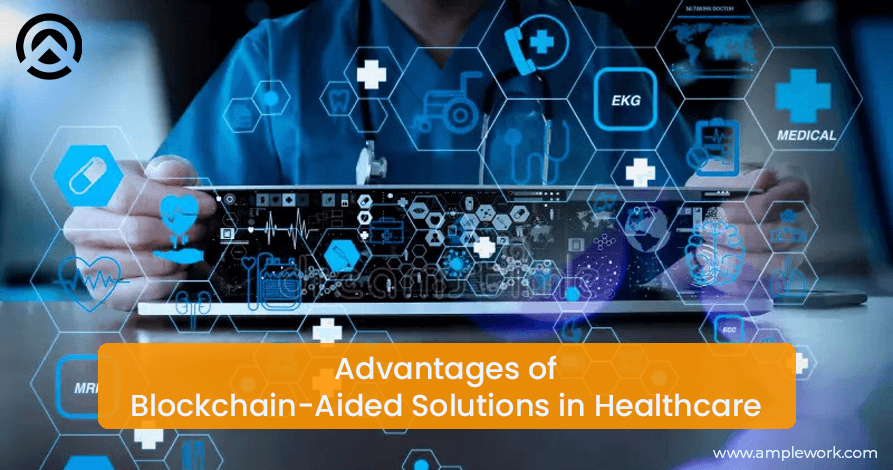Securing Patient Data: How Blockchain Solutions are Revolutionizing Healthcare
Bringing technology within the operational practices works on making them more advanced. In other words, such technology holds the potential of reforming these processes. The emergence of Blockchain in healthcare technology in healthcare can lead to the generation of effective outcomes. This is defined as a shared immutable ledger that avails the procedure of recording transactions. And tracking assets within a business network. In the healthcare sector, the integration of this technology can result in resolving many existing issues. In the same context, patient data security is considered as one of the essential factors. That needs to be maintained properly security. The healthcare industry can face major consequences due to the loss of such confidential information about their patients.

The research analysis by Research and Markets highlights the major growing aspects of blockchain in healthcare today market. As shown in the above figure, the global blockchain market is expected to grow at USD 22.69 billion. In the coming future, this forecast can lead to a growth of approximately USD 89.31 billion in 2028. This shows the expected increase of 31.5% compound annual growth rate and other market values.
This expected growth can work on reducing the data security challenges that are faced by healthcare industry professionals. These challenges can be in the form of data transparency, immutability, audits, traceability issues, problems flexible issues, data privacy issues, and other data security issues.
Blog Highlights
This blog is about highlighting the importance of blockchain-aided solutions. Which can work on reducing the impact of data security challenges faced by the healthcare sector. This content is helpful in the aspect of a healthcare professional. Who is struggling to get a solution for data privacy issues? A quick read of this can save your patient’s valuable data.
Implementing Blockchain’s Healthcare Data Management
No doubt Blockchain app development is expanding its growth in the healthcare department. But when it comes to managing the security of patient data it offers the best solutions. This technology invented completely revolutionalizing solutions and has a complete tendency of future security. These innovative praises are mentioned further.
1. Electronic Medical Record (EMR) Data Management
In the age of digitized healthcare, EMRs have emerged as the linchpin of modern medical practice. Blockchain in mobile app development introduces an innovative dimension to EMR data management, creating an indomitable and irrefutable ledger. We meticulously time-stamp, encrypt, and securely enter each medical record into the blockchain. Ensuring not only the sanctity of healthcare data but also guaranteeing expedited yet highly protected accessibility to authorized parties. Patients and healthcare providers can place unwavering trust in the security and veracity of their medical records. This technological synergy between EMRs and blockchain technology bolsters data integrity, safeguards patient privacy, and accelerates clinical decision-making, ushering in a new era of secure and efficient healthcare management. While reinforcing trust in the safeguarding of the most sensitive patient information.
2. General Data Protection Regulation (GDPR)
This represents a transformative milestone in data privacy and protection. Compliance is paramount, especially within the realm of healthcare. Building blockchain apps offers an impeccable alignment with GDPR principles by affording individuals a substantial say in the management of their data. Patients wield the authority to grant or revoke access to their medical records handing them the reins of their privacy. The transparency and auditable nature of blockchain ensure that GDPR compliance is not only attainable but demonstrable. Thereby reinforcing the trust between patients and healthcare entities in the realm of data security.
3. Personal Health Record (PHR) Data Management
Particularly when dealing with Personal Health Records (PHRs) that frequently house profoundly sensitive information. Blockchain in healthcare technology not only enables secure storage but also provides individuals with the means to efficiently manage, update, and share their healthcare data, all while maintaining the highest standards of security. In a healthcare landscape where patient engagement is increasingly pivotal, blockchain’s role emerges as a linchpin of this paradigm shift.
Patients not only hold the keys to their PHRs but also become active participants in their healthcare journey. This newfound agency not only enhances transparency and trust within the patient-provider relationship but also promotes a more collaborative approach to healthcare management, where patients and healthcare providers become partners in the quest for better health outcomes. The patient-centric nature of blockchain-driven PHRs marks a significant step toward healthcare personalization and the assurance of privacy, ultimately fostering a stronger and more cooperative healthcare ecosystem.
4. Blockchain Point-of-Care Geonomics
Point-of-Care Genomics stands as a transformative frontier within the realm of healthcare, poised to catalyze a seismic shift in medical treatment and research. The potential to tailor medical interventions based on an individual’s genetic makeup holds immense promise. However, this innovation hinges on the secure handling of genetic data, which is intrinsically sensitive and subject to stringent privacy considerations. In this context, blockchain technology emerges as a steadfast sentinel.
By storing genetic data within the blockchain, it becomes impervious to tampering, manipulation, or unauthorized access, guaranteeing the confidentiality and integrity of this deeply personal information. Such security measures empower patients to participate more readily in genomic research and personalized medicine initiatives, knowing that their data is safeguarded. The data security afforded by blockchain technology is instrumental in maintaining the sanctity of sensitive genetic information and promoting the advancement of genomics research and tailored medical treatments.
5. Electronic Health Record (EHRs)
These records have evolved into the cornerstone of the modern healthcare industry, furnishing comprehensive and data-rich insights essential for informed patient care. However, this wealth of information comes with a heightened responsibility for safeguarding the security and privacy of patient records. In this endeavor, blockchain technology is nothing short of revolutionary. With the integration of blockchain, the security of EHRs reaches a new echelon, establishing a robust defense against potential breaches.
Data is distributed across a network of nodes in a decentralized fashion, effectively obliterating the risk of a single point of failure that often plagues centralized systems. Patients can place unwavering trust in the accuracy and security of their EHRs, knowing that their confidential medical history remains shielded from unauthorized access. Healthcare providers, on the other hand, can operate with the assurance that patient data remains both accessible and secure. Blockchain in healthcare not only fortifies the integrity of EHRs but also instills a renewed sense of confidence in the healthcare system, underlining the critical role it plays in ensuring data security and patient trust in the digital age.
Read more: HealthCare Website Development: A Comprehensive Guide
Advantages of Blockchain-Aided Solutions in Healthcare

The emergence of technology brings advancements as well as challenges. In the healthcare sector, patient healthcare data sets are considered as an essential set of information that requires effective management and protection. The involvement of blockchain technology helps prevent these data sets from any issues. The major benefits of this technology are mentioned further.
Aggregated Personal Health Information
Blockchain technology provides an innovative solution for the aggregation and secure storage of Personal Health Information (PHI). Patients medical records, test results, treatment histories, and more can be aggregated and stored in a decentralized ledger. This not only allows for the creation of a comprehensive and easily accessible health profile but also empowers individuals to have complete control over their healthcare data. This aggregated data simplifies the process for healthcare providers to make informed decisions, resulting in more personalized, timely, and effective care.
Patient-centered Control of Data Access and Use
One of the most significant advantages of blockchain in healthcare is the patient-centered control it offers over the access and use of personal data. Patients can grant or revoke access to their medical records and information as needed. This not only aligns with data protection regulations such as GDPR but also fosters patient trust and confidence in the security of their sensitive health data. Patients become active participants in their healthcare journey, enhancing the doctor-patient relationship and facilitating collaborative care.
Enhanced Data Security and Integrity
Blockchain technology’s robust security features are pivotal in ensuring the integrity and confidentiality of healthcare data. Data stored on a blockchain is encrypted, time-stamped, and distributed across a network of nodes. This makes the data impervious to unauthorized alterations and breaches. Enhanced data security ensures that patient records remain accurate and protected, reducing the risk of medical identity theft and data breaches.
Better Health Outcomes with Proper Test
Blockchain technology plays a crucial role in ensuring that medical tests and diagnostic results are accurate and reliable. With blockchain, patients can verify the authenticity and origin of medical tests, reducing the chances of misdiagnoses or erroneous treatment decisions. This contributes to improved health outcomes by ensuring that treatment plans are based on verified and trustworthy data.
Effective Management of Big Data
The healthcare sector generates a massive amount of data, often referred to as Big Data. Blockchain technology provides an efficient and secure means to manage, store, and analyze this wealth of information. It enables researchers and healthcare organizations to harness the power of Big Data for medical research, epidemiological studies, and the development of innovative treatment approaches.
Related Blog: How Blockchain is Advancing The Healthcare Industry
Conclusive Outlines
Within the healthcare sector, the integration of blockchain technology is playing a pivotal role in revolutionizing the way patient data is secured and managed. This innovative approach offers comprehensive solutions tailored to meet the diverse needs of healthcare settings. As the demand for efficient and secure patient data management continues to surge, visionary developers and forward-thinking healthcare organizations committed to enhancing patient care through technological innovations are on the rise. Despite the initial challenges often faced in this field, many have successfully emerged as trailblazers in leveraging big data in the healthcare sector. In today’s constantly evolving healthcare landscape, the adoption of intelligent digital solutions has become progressively more accessible, empowering healthcare providers to seamlessly adapt to the evolving requirements of modern healthcare.
Amplework, with its impressive 5+ years of immersive experience, holds a prominent position in the arena of healthcare app development company. Our dedicated team consistently exceeds client expectations, earning a well-deserved reputation for reliability and trustworthiness. We’ve achieved a significant milestone by providing support to various organizations, contributing to a revenue generation of 200 million. We invite you to explore our website to uncover the exceptional healthcare app development services we offer. Partner with us to embark on a transformative journey towards more efficient and secure patient data management, ultimately enhancing the quality of care provided by healthcare professionals, in this era where blockchain solutions are revolutionizing healthcare and ensuring patient data security.


 sales@amplework.com
sales@amplework.com
 (+91) 9636-962-228
(+91) 9636-962-228





